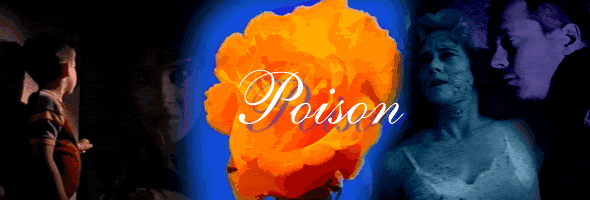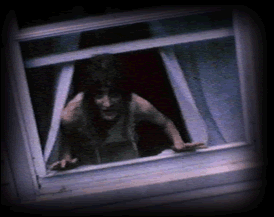
Color, 1991, 85 mins. Directed by Todd Haynes
Starring Scott Renderer, Millie White, Buck Smith, James Lyons, Edith Meeks, Larry Maxwell, Susan Norman / Produced by Christine Vachon / Music by James Bennett
Format: DVD - Fox Lorber (MSRP $29.98)
Full Frame / Dolby Digital Mono
A fascinating, narratively perverse triptych of stories, Poison ignited a firestorm of controversy when its post-production funding by the National Endowment for the Arts became a target of the religious right. Par for the course, none of the accusors bothered to watch the film or even do their homework, but the damage was still inflicted, evaporating many government-sponsored arts programs for future generations. Designed as a feature follow up to the celebrated (and sadly unavailable) Superstar: The Karen Carpenter Story, this film quickly put Todd Haynes on the map outside of the standard "gay filmmaker" status, though none of his subsequent efforts have garnered the notoriety of this acidic debut.
Sprinkled with quotes and situations from the literature of renowned French writer/thief/convict Jean Genet (Our Lady of the Flowers), the film posits three stories relentless intercut within each other to produce an escalating sense of unease. In "Hero," a pseudo-documentary, various family members and acquaintances discuss Richie Beacon, a very different young boy who, according to his mother, killed his father and flew out the window. In "Horror," Dr. Graves (Larry Maxwell) manages to chemically isolate the human sex drive but, in a moment of carlessness, becomes Elegantly assembled and often disturbing, Poison operates primarily through subliminal suggestions which only take hold in the viewer's mind long after the closing credits have rolled. The three stories contrast wildly in terms of style and acting methods, linked only by their vaguely overlapping themes of social ostracism and sexual anxiety in the tradition of David Cronenberg. The intercutting of the stories is alternately compelling and frustrating as it constantly tweaks expectations to the breaking point; in particular, "Horror" (which plays like a depraved, AIDS-inspired variation on Joe Dante's "Mant!" from Matinee) could just as easily flow as a single narrative without the interruptions. Considering the lack of budget and experience, the performers all do well, with Rederer standing out in particular thanks to his marvelously expressive facial reactions.
In 1992, Fox Lorber released Poison on VHS in no less than three versions (an appropriate number): an uncut NC-17 version, an unrated version (which omits a fleeting glimpse of explicit male nudity), and an R-rated version (completely useless). Shot on 16mm and blown up to 35 for theatrical distribution, Poison has always suffered from graininess and a somewhat muddy image during the darker scenes, problems which are still present on the uncensored DVD. Under the circumstances, Fox Lorber has probably done about as well as could be expected, and the daylight sequences look better and cleaner than they ever have before. Unfortunately, the darker scenes (i.e., the opening credits and virtually all of the prison interiors) suffer from what looks like a substandard compression job, littered with jittering and rolling digital patterns in the background and shadows. Turning down the monitor's brightness control helps solve most of the problem, but it still sadly marks a step back after the company's more impressive and improved recent DVD work. This flaw aside, though, Poison makes for a surprisingly impressive DVD release, complete with the trailer (and yes, in a Fox Lorber rarity, it really is the theatrical trailer), and - surprise! - a running feature length commentary by Haynes, Lyons, and producer Christine Vachon (who went on to Happiness and Boys Don't Cry). Haynes frequently expresses his surprise at how linear the film is considering its experimental roots, and he often throws in a humorous aside to keep things bouncing along. Vachon and Lyons focus more on the production end of the film, relating the various difficulties in getting it financed and filmed. In particular, Vachon offers the real paydirt of the commentary one hour into the film with a lengthy, fascinating account of her dealings with Genet's estate (a surprising revelation). Though the transfer itself may still be as imperfect as always, these nice bonuses make the DVD the most satisfying (and most affordable) presenatation to date.
 infected by his own serum and experiences a bodily degeneration akin to leprosy. His beautiful colleague, Nancy (Susan Norman), attempts to deal with her simultaneous feelings of pity, attraction, and revulsion as the city revolts against what it perceives as a diseased menace. In "Homo," the most Genet-inspired segment, an inveterate thief, John Broom (Scott Renderer), finds his prison life disrupted with the arrival of Bolton (James Lyons), the object of his affection from their old reformatory days. However, Bolton does not return Broom's affections... or does he? A graphic and unsettling flashback to their youth unveils the traumas which bind the two men and ultimately lead to one man's tragic fate.
infected by his own serum and experiences a bodily degeneration akin to leprosy. His beautiful colleague, Nancy (Susan Norman), attempts to deal with her simultaneous feelings of pity, attraction, and revulsion as the city revolts against what it perceives as a diseased menace. In "Homo," the most Genet-inspired segment, an inveterate thief, John Broom (Scott Renderer), finds his prison life disrupted with the arrival of Bolton (James Lyons), the object of his affection from their old reformatory days. However, Bolton does not return Broom's affections... or does he? A graphic and unsettling flashback to their youth unveils the traumas which bind the two men and ultimately lead to one man's tragic fate.
